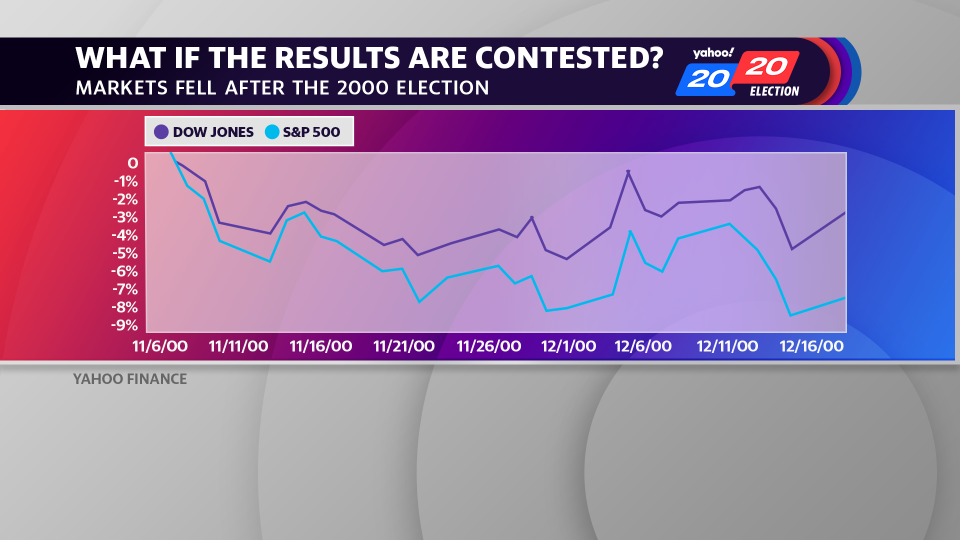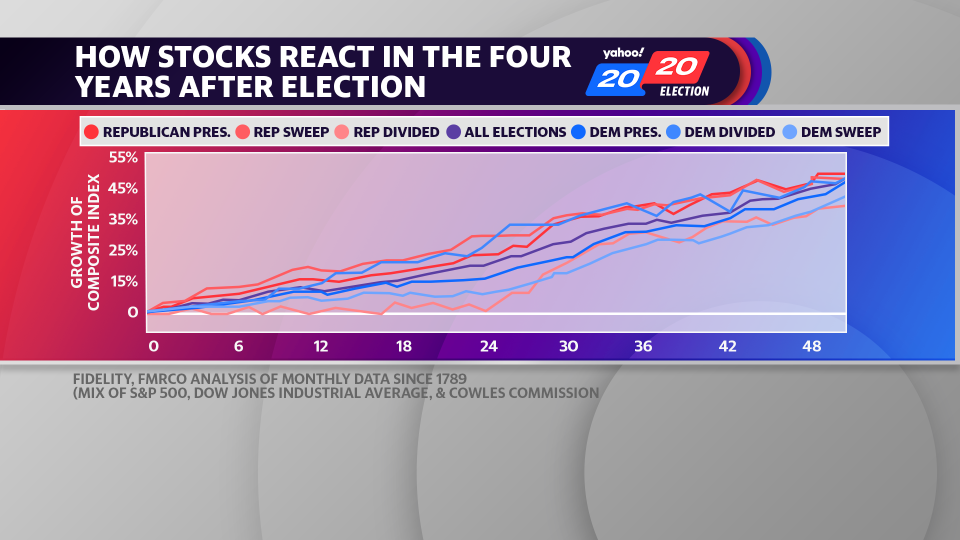What to expect from markets under a contested 2020 election
For more business and finance explainers, check out our Yahoo U page.
Investors may want to buckle in for another few days of uncertainty with the Trump administration looking ready to fight the 2020 election results.
As of Wednesday afternoon, several states had not yet finalized their presidential election results. But the Trump campaign had already committed to “immediately” calling for a recount in Wisconsin after several outlets declared victory for Democrat Joe Biden.
Markets appeared to react positively through those developments, with the S&P 500 logging an 2.21% bump to 3,443.47 and the Dow Jones Industrial Average adding 1.34% to 27,847.93 at market close on Wednesday.
A measure of volatility known as the VIX had fallen from 35 on Tuesday to 29.64 on Wednesday afternoon, hinting that the election results were easing, not increasing, uncertainty.
“Markets are reacting very positively to the fact that a great deal of the election uncertainty has passed,” said Brad McMillan, CIO at Commonwealth Financial Network on November 4. “Not all of it, but at least the worst outcomes seem to have been avoided.”
Although markets may not have known the exact outcome of the election, investors may have already priced in the assumption of a contested election. JPMorgan strategist John Normand writing, in late September, that a battle over the election results is their “baseline” expectation.
The market reaction appears to be different from the market response to the 2000 recount in the Bush versus Gore election, when a tight race in Florida left the nation without a clear winner for over a month.
In the days after election day on 2000, the S&P 500 fell as deeply as 8% as legal battles erupted over a recount. The VIX peaked at almost 30.

The Supreme Court ended the uncertainty with its 5-4 decision on December 12 that effectively declared Bush the winner, by which point the VIX had fallen below 25. Still, the S&P remained 5% below its level before Election Day, although markets may have been driven by other factors.
This election is different
One unique aspect of this 2020 election is the fact that it is occurring in the middle of a global pandemic and the deepest recession since the Great Depression.
At stake: a fiscal package to get relief to households struggling to make ends meet and businesses unable to recover revenues lost during the shutdowns.
UBS Chief investment officer Mark Haefele wrote November 4 that the markets are still being driven by other factors as well, like the optimism over a widespread vaccine by the second quarter of 2021 and aggressive policy actions from the world’s central banks.
“Downside risks remain in a contested election outcome, but the key drivers for risk assets are still in place in our view,” Haefele said.
But even with concerns over heightened volatility, strategists are advising against dramatically shifting allocations, depending on investment horizon.
For example, Fidelity’s Jurrien Timmer has written that regardless of political party and who is in power, the first two years of a presidential term tend to produce below-average returns whereas the second half of an administration tends to produce above-average returns.

BlackRock notes that a steady hand may be the best way for investors to approach the choppy waters of a contested election.
“We prefer to look through any market volatility that a delayed result may bring and favor taking advantage of any selloffs in risk assets during this period of uncertainty to add to high-conviction positions,” reads a November 2 note from BlackRock Investment Institute.
This article was updated from an earlier version published on November 3, 2020.
Brian Cheung is a reporter covering the Fed, economics, and banking for Yahoo Finance. You can follow him on Twitter @bcheungz.
Fed lowers minimum loan size on small business loans to Main Street
Former NY Fed President: No conflict of interest between Fed and Congress
Former NY Fed chief: Central bank's ability to stimulate economy 'rapidly diminishing'
Less-educated Asian Americans among hardest hit by job losses during pandemic
A glossary of the Federal Reserve's full arsenal of 'bazookas'
Read the latest financial and business news from Yahoo Finance
Follow Yahoo Finance on Twitter, Facebook, Instagram, Flipboard, SmartNews, LinkedIn, YouTube, and reddit.

 Yahoo Finance
Yahoo Finance 
